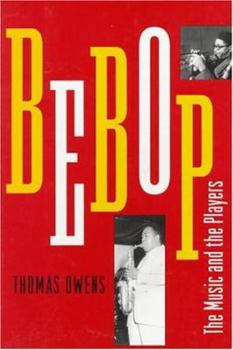Bebop: The Music and Its Players
Select Format
Select Condition 
Book Overview
"When bebop was new," writes Thomas Owens, "many jazz musicians and most of the jazz audience heard it as radical, chaotic, bewildering music." For a nation swinging to the smoothly orchestrated sounds of the big bands, this revolutionary movement of the 1940s must have seemed destined for a short life on the musical fringe. But today, Owens writes, bebop is nothing less than "the lingua franca of jazz, serving as the principal musical language of thousands of jazz musicians."
In Bebop, Owens conducts us on an insightful, loving tour through the music, players, and recordings that changed American culture. Combining vivid portraits of bebop's gigantic personalities with deft musical analysis, he ranges from the early classics of modern jazz (starting with the 1943 Onyx Club performances of Dizzy Gillespie, Max Roach, Oscar Pettiford, Don Byas, and George Wallington) through the central role of Charlie Parker, to an instrument-by-instrument look at the key players and their innovations. Illustrating his discussion with numerous musical excerpts, Owens skillfully demonstrates why bebop was so revolutionary, with fascinating glimpses of the tempestuous jazz world: Thelonious Monk, for example, did "everything 'wrong' in the sense of traditional piano technique....Because his right elbow fanned outward away from his body, he often hit the keys at an angle rather than in parallel. Sometimes he hit a single key with more than one finger, and divided single-line melodies between two hands." In addition to his discussions of individual instruments and players, Owens examines ensembles, with their sometimes volatile collaborations: in the Jazz Messengers, Benny Golson told of how his own mellow saxophone playing would get lost under Art Blakey's furious drumming: "He would do one of those famous four-bar drum rolls going into the next chorus, and I would completely disappear. He would holler over at me, 'Get up out of that hole '"
In this marvelous account, Owens comes right to the present day, with accounts of new musicians ranging from the Marsalis brothers to lesser-known masters like pianist Michel Petrucciani. Bebop is a jazz-lover's dream--a serious yet highly personal look at America's most distinctive music.
In Bebop, Owens conducts us on an insightful, loving tour through the music, players, and recordings that changed American culture. Combining vivid portraits of bebop's gigantic personalities with deft musical analysis, he ranges from the early classics of modern jazz (starting with the 1943 Onyx Club performances of Dizzy Gillespie, Max Roach, Oscar Pettiford, Don Byas, and George Wallington) through the central role of Charlie Parker, to an instrument-by-instrument look at the key players and their innovations. Illustrating his discussion with numerous musical excerpts, Owens skillfully demonstrates why bebop was so revolutionary, with fascinating glimpses of the tempestuous jazz world: Thelonious Monk, for example, did "everything 'wrong' in the sense of traditional piano technique....Because his right elbow fanned outward away from his body, he often hit the keys at an angle rather than in parallel. Sometimes he hit a single key with more than one finger, and divided single-line melodies between two hands." In addition to his discussions of individual instruments and players, Owens examines ensembles, with their sometimes volatile collaborations: in the Jazz Messengers, Benny Golson told of how his own mellow saxophone playing would get lost under Art Blakey's furious drumming: "He would do one of those famous four-bar drum rolls going into the next chorus, and I would completely disappear. He would holler over at me, 'Get up out of that hole '"
In this marvelous account, Owens comes right to the present day, with accounts of new musicians ranging from the Marsalis brothers to lesser-known masters like pianist Michel Petrucciani. Bebop is a jazz-lover's dream--a serious yet highly personal look at America's most distinctive music.
Format:Hardcover
Language:English
ISBN:0195052870
ISBN13:9780195052879
Release Date:February 1995
Publisher:Oxford University Press, USA
Length:344 Pages
Weight:1.50 lbs.
Dimensions:1.2" x 6.4" x 9.5"
Customer Reviews
2 ratings
It's about the music!
Published by Thriftbooks.com User , 23 years ago
It is gratifying to find such a carefully written study of bebop -- a study which focuses from start to finish on the music. We know that many of the musicians had troubled lives and suffered with drugs and discrimination. The social and personal dimensions of bebop, however, have received ample attention in books, movies, and TV shows. This book is almost unique in providing a readable and scholarly analysis of the music. Owens faced a number of choices as to how to present his material, and he made the intelligent choice each time: Focus on the music (rare), not the details of "personal problems" (common); present just the right level of technical detail, never vague but never overly pedantic; trace the historical development of the music rather than an abstract description or a "how to play bop" approach (also common); and my favorite: organize the discussion around the idioms and masters of specific instruments -- sax, trumpet, piano, and so on. This last choice enables him to provide fresh insights as to how specific stylistic innovations on different instruments finally produced the characteristic ensemble style of bebop. I've bought two copies and I'm constantly recommending this book to friends.
Invaluable Reference for the Jazz Player or Student
Published by Thriftbooks.com User , 24 years ago
A thourough exploration of the style of Parker, Gillespie, Davis, Evans and dozens of others. Replete with transcriptions and stylistic summaries. Many recordings reviewed. And his enthusiam for all that is Bebop matches Clint Eastwood's for "Bird". A musicological gem.






